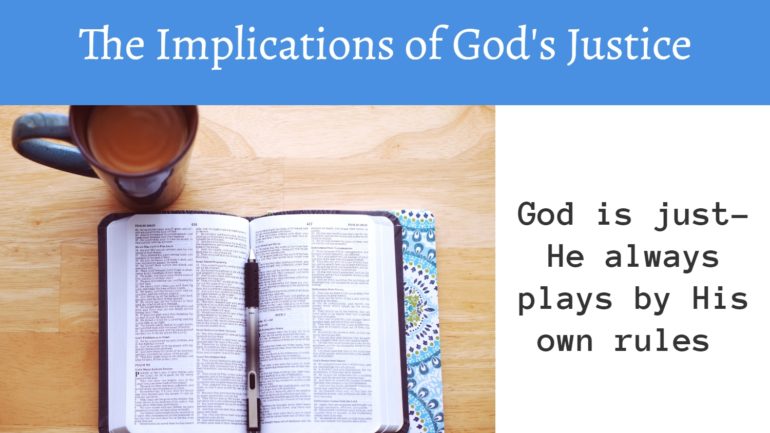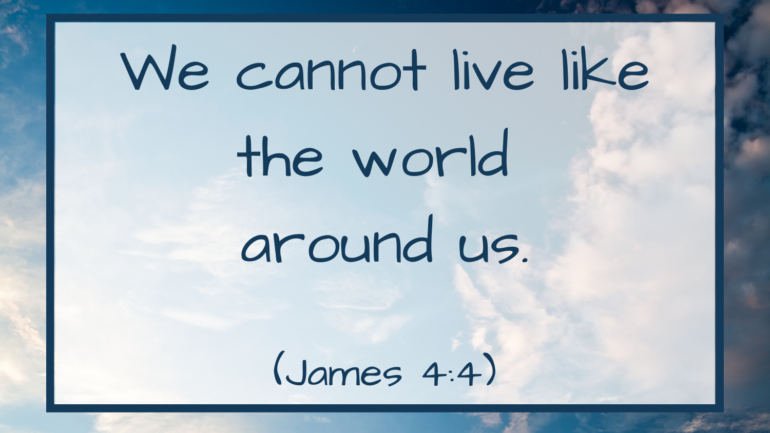Is God really just?
No one has a problem with God’s love. No one has a problem with God’s mercy or compassion. However, people really seem to struggle with God’s justice. As we read the Bible, especially the Old Testament, we read many stories where God seems harsh or unfair in His judgment on people.
For example, many people think that God was unfair in Leviticus 10:1-2:
Now Nadab and Abihu, the sons of Aaron, each took his censer and put fire in it and laid incense on it and offered unauthorized[a] fire before the Lord, which he had not commanded them. And fire came out from before the Lord and consumed them, and they died before the Lord.
Nadab and Abihu were Aaron’s sons, and as such, they were priests in God’s temple. We don’t know exactly what the strange or unauthorized fire was that they offered. We may think that they were just being creative in their worship. Why would God strike them down for that? How is that just?
Justice means getting what you deserve. To understand God’s justice, we must first understand exactly what we deserve.
What do we really deserve?
We have to realize that we are sinners (Romans 2:23; 1 John 1:8). We are all guilty of breaking God’s law. We’ve been tried and convicted in God’s courtroom, and we’ve been sentenced to death. Ezekiel 18:4 says that the soul who sins shall die. So, what we deserve, what justice demands, is that we die because of our sin.
With that in mind, God was just in striking down Nadab and Abihu. As priests, they knew how they were supposed to offer incense on the altar. God was very specific in His instructions. God even commanded them not to offer any incense other than what He had prescribed (Ex. 30:9-10). By offering unauthorized fire, they were openly rebelling against God. They knew what He commanded, but they chose to do it their own way. They sinned against God in their arrogance.
The evidence was in, and God had rendered His verdict. The sons of Aaron had been explicitly forbidden from offering such fire. They committed an act of disobedience, and God lowered the gavel of His justice on them.
R.C. Sproul
So, God is just in punishing sin. Now, let’s look a few characteristics of God’s justice:
God’s justice is always fair.
The truth is, because everyone is a sinner and everyone deserves death, then we cannot claim that God is unjust for carrying out that sentence. Because of His justice, God punishes sin. We should not be surprised when that happens. The problem is, we try to hold God to our standard of fairness. In our eyes, His punishment doesn’t always appear to fit the crime. We may think that instant death was too harsh for Nadab God’s and Abihu’s creative worship. However, when we realize that the true crime behind all sin is actually treason against the Most High God, which is deserving of death, we’ll understand that God’s justice is always fair.
His justice is never unfair, never whimsical, never tyrannical. It is impossible for God to be unjust because His justice is holy.
R.C. Sproul
Because God is incapable of sinning, He is also incapable of executing justice unfairly. Because God is perfect, His justice is perfect.
The biblical idea of justice actually has to do with playing by the rules. Of course, God is the rules. He is the standard for right and wrong. There is not some outside set of laws that God must abide by in order to be fair. Something is fair and right because God does it. Because God does not change, His rules do not change, so we always know what to expect.
He also applies the rules equally to every person, regardless of race, class, gender, etc. We all must play by the same rules, in spite of the culture or time in which we live. The standard by which we must all live is the very character of God. In other religions, you are judged for how well you obey the rules of the religion. However, God judges us based on how closely we conform to the image of His Son.
In human courts, the judge and jury are not aware of all the facts. They can only base their verdict on the evidence presented. Sometimes, justice fails in the human court. Guilty people are acquitted and innocent people are convicted. These people can cry, “That’s not fair!” because they don’t get what they deserve. However, no one can claim that in God’s court. Because God knows everything and is everywhere, His verdict is based on the truth. He knows exactly what you are guilty of, so you cannot claim He’s unfair in His sentence.
God’s justice is never late.
We may question God’s justice when it seems that sinners go unpunished. However, justice is not always served immediately. I enjoy watching true crime shows on TV. I like one show called Cold Case Files. Criminal cases go cold when there are no new leads to investigate. Many of these cases are never solved. However, some are solved many years after the original crime was committed. The criminal thinks that he’s gotten away with his crime, but eventually he is made to pay for what he has done. Just because justice was delayed in those cases doesn’t mean that justice never happened.
Another show my husband likes is Unsolved Mysteries. I don’t like that one, though, because many cold cases are never solved. I want the people caught and justice served, but that often never happens in the human court. However, there are no unsolved mysteries in God’s court.
When we or someone we care about is wronged, we want instant satisfaction. When we see the atrocities that some people carry out, we want them to pay now. They may never pay for what they’ve done to us. But spending a few years, or even a lifetime, in prison, is nothing in comparison to the punishment waiting for them after they die. They will pay for what they’ve done to God, for sinning against Him. We must remember that God’s court trumps the human court system. His verdict and punishment far outweigh any punishment a person would receive on Earth.
We see only a partial display of God’s justice from our narrow perspectives. One lifetime is not always enough time to witness justice served…God’s flawless justice requires that He punish all sin, but He does not always do so for us to see.
Jen Wilkin
We all deserve instant death for our sin, but even when God chooses to delay justice, people will eventually pay for what they’ve done. God is eternal, outside of our concept of time. He doesn’t have to be in a rush like we are to see things happen. He knows that eventually everything will work out just as He has planned.
God’s justice cannot be escaped.
Man has come up with a number of ways to try to escape God’s punishment. Some people try to shift the blame for their sins to someone else. Others may hope that God won’t judge them because they aren’t as bad as other people. Some may believe that they are ok as long as their good deeds outweigh their bad. Many people even rewrite the list of sins so that their behavior doesn’t qualify. None of these things will save them from God’s judgment, however.
In God’s courtroom, the guilty never escape; they always get exactly what they deserve.
Joel James
The only method that works for escaping God’s justice is substitution. The Bible teaches that without the shedding of blood, there is no forgiveness of sin (Heb. 9:22). Someone has to die for your sin. It’s either you or a substitute. The Old Testament used animal sacrifices, but that was not good enough. That was only a temporary solution.
Fortunately, God Himself provided the necessary Substitute for us. Jesus is the only real substitute that is sufficient to take our place. God’s justice was poured out upon Christ on the cross, so that we no longer have to face the punishment for our sin. Jesus got what we deserved so that we don’t have to.
Implications of God’s Justice
We should have hope.
There is a lot of injustice in this world. A lot of people are suffering unfairly. However, no matter what people do to us, no matter how much they persecute us, we can have hope in knowing that one day they will pay for their sins. It may not be on our timetable, but God’s justice will be served eventually.
For those of us in Christ we should be especially hopeful because we will not have to face God’s justice. We will spend our eternity in heaven because of what Christ did for us, so we have no reason to despair, no matter how unfair life seems.
We should share the Gospel.
God’s justice demands that the penalty for sin is death, followed by an eternity in hell. However, we know the only means by which we can escape that justice is through Jesus Christ. Out of compassion for others, we should want to share with them the Gospel so that they too may escape justice and enjoy a future in heaven.
This post is part of a series entitled Seeking God’s Face: Discovering the God of the Bible, which is based on a Bible study I’m teaching at my church. In this study, we’ll be rethinking our impressions of God by searching the Scriptures to find out who He really is. You can find other posts, as well as additional Bible study resources, here:
SEEKING GOD’S FACE: DISCOVERING THE GOD OF THE BIBLE
The information in this post was based on the following resources:
In His Image: 10 Ways God Calls Us to Reflect His Character by Jen Wilkin
The Holiness of God by R.C. Sproul
Taste and See that the Lord Is Good: A Study of the Attributes of God by Joel James
Unless otherwise noted, Scripture quotations are from The ESV® Bible (The Holy Bible, English Standard Version®), copyright © 2001 by Crossway, a publishing ministry of Good News Publishers. Used by permission. All rights reserved.







Seeking God's Face: Discovering the God of the Bible - She Lives Worthy %
[…] The Implications of God’s Justice (blog post) […]